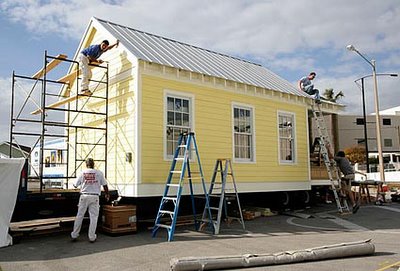Board adopts smoke-free ordinance
By BRIAN HAWKINS/Starkville Daily News
Cheers erupted from the standing-room-only crowd in the City Hall courtroom Tuesday night after members of the Starkville Board of Aldermen voted unanimously to adopt an ordinance prohibiting smoking in public places and in places of employment.
The ordinance, adopted after a brief public hearing during Tuesday night's Board of Aldermen meeting, takes effect 60 days from Tuesday and specifically defines where smoking is prohibited in the city, requirements for posting “no smoking” signs, responsibilities of business owners, enforcement and violations.
The ordinance was developed by an appointed committee that included three members of the Board of Aldermen, two local restaurateurs, a representative from the Mississippi State University Student Association and two community health advocates working with the Citizens for a Breathe-Free Starkville group.
“We put together a group of stakeholders who had different opinions on the issue and developed an ordinance from scratch for Starkville,” said Ward 5 Alderman Matt Cox, one of the three aldermen on the committee. “We came together with a job to do and we got it done well.”
Robert McMillen, a researcher at MSU and one of the two leaders of Citizens for a Breathe-Free Starkville on the ordinance committee, said the board's adoption of the ordinance makes Starkville the first major municipality in Mississippi to go smoke-free.
“We're very happy with the final ordinance. It showed leadership and that Starkville is a leader in the state in demonstrating that we as a community deem the health of our people as important,” McMillen said.
Members of Mississippi State fraternities expressed concern Tuesday night over a provision within the ordinance prohibiting smoking in common areas of the Greek houses, the majority of which on Fraternity Row and Sorority Row are located within the city limits.
Presidents of at least three fraternities - Kappa Alpha Order, Sigma Alpha Epsilon and Lambda Chi Alpha - requested that the board not act on the ordinance to allow MSU Greek organizations to determine their position on the issue, especially since most had only learned of plans to regulate fraternity and sorority houses in the last several days.
Ultimately, the provision regarding Greek organization houses was removed after it was determined that a later clause in the ordinance eliminated the need for their inclusion since the clause in question stated that rules of other governmental jurisdictions regarding smoking - including those at the University, would supercede the ordinance regulations.
Multiple residents smoke in favor of implementing the ordinance.
Among the indoor public places where smoking will be prohibited when the ordinance takes effect are:
€ Childccare facilities.
€ City buildings.
€ Common areas in bed and breakfast establishments, hotels and motels.
€ Elevators and enclosed stairwells.
€ Health care facilities.
€ Indoor shopping malls.
€ Places of employment.
€ Polling places.
€ Public forms of transportation, including but not limited to motor buses, taxicabs, or other public passenger vehicles.
€ Public bus and transfer point shelters.
€ Retail stores.
€ Enclosed, indoor areas of restaurants and bars.
€ Self-service laundry facilities.
€ Service lobbies, waiting areas, and the common areas open to the public of financial institutions, businesses and professional offices, and multi-unit commercial facilities.
€ Indoor sports arenas and venues.
€ Waiting rooms, hallways, rooms in offices of any physician, dentist, psychologist, chiropractor, optometrist or optician, or other medical services provider.
Exemptions to the ordinance include allowing smoking include:
€ Bed and breakfast, hotel and motel rooms that are rented to guests and are designated as smoking rooms.
€ Private clubs.
The ordinance also includes regulations prohibiting smoking in certain outdoor areas, including:
€ Areas immediately preceding or blocking the entrance and/or exit of an area where smoking is prohibited.
€ Attached areas of restaurants that are covered or partially covered with more than 50 percent of the perimeter of the outside area walled or otherwise closed to the outside.
€ Seating areas of outdoor sports arenas and venues.
Penalties for violations of the ordinance include a fine of no more than $50 for the first offense and no more than t$250 for the second and subsequent offenses.
Another provision within the ordinance allows the Board of Aldermen to suspend or revoke any business license or permit issued by the city for three or more violations of the ordinance by a specific business within a 12-month period.
The ordinance also contains a clause allowing for its repeal in the summer of 2008 if city officials evaluate its effectiveness and deem it necessary to repeal the law.

